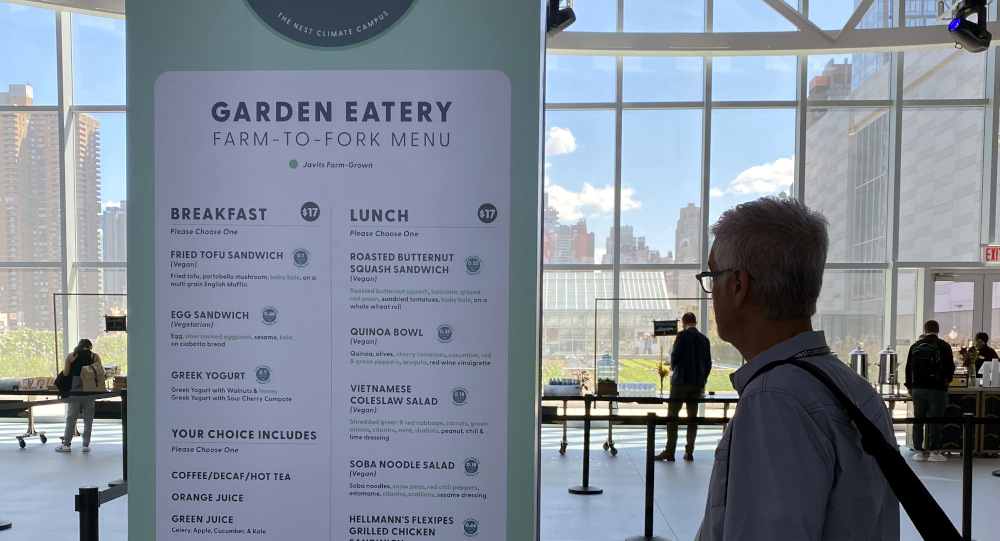Event organizers globally are recognizing the need to evolve standard event
practices into more sustainable versions. With the many routes trade shows and
conferences can use to reduce their environmental footprint, the food and
beverages served onsite mustn't be overlooked. With more than a third of all
human-caused greenhouse gas emissions linked to the food system, the food and
beverage items served to event attendees can significantly impact the event’s
carbon footprint. Using climate-impact labels is one way events can persuade
attendees to choose more sustainable menu options.
Consider the recent COP28
installation from MAF
Carrefour,
which brought holistic climate-impact labels to its food products in partnership
with HowGood and Vusion.
These labels were digitally displayed across more than 2,500 products at the
United Nations’ annual climate conference to provide seamless visibility and
empowered decision-making for attendees. Making those impact metrics available
to consumers has become more readily available following rising demand. And
those with
labels
see the benefits, too: Products making ESG-related claims averaged 28 percent
cumulative
growth
over the past five-year period.
Climate labeling demonstrates commitment
 Carbon-labeled menus at Climate Week NYC 2023 | Image credit: HowGood
Carbon-labeled menus at Climate Week NYC 2023 | Image credit: HowGood
Climate labeling demonstrates a clear commitment to carbon reduction. It enables
organizations to showcase their transparency while empowering customers to make
informed decisions. Moreso, it marks a public declaration of a company’s
commitment to reducing impact. Claims on products can likewise communicate a
variety of sustainability initiatives: A product carbon footprint
label,
for instance, showcases the measures of greenhouse gas emissions (GHGs) of a
product, from cradle to shelf. Simplistic rating
systems
have also shown to be successful — denoting “Best,” “Great” or “Good” to point
to products with lower social and environmental impacts than conventional
products; while highlighting individual attributes — such as
WaterSense,
Fairtrade or Clean
Label —
provides clear and quick details for shoppers.
Chipotle has incorporated a similar approach with its “Real
Foodprint” initiative. Through a sustainability
assessment of all 53 ingredients on the Chipotle menu, the true environmental
and social impact of every order can be calculated. The Real Foodprint impact
tracker
looks at five key metrics to demonstrate the impact of its sourcing practices:
Less Carbon in the Atmosphere, Gallons of Water Saved, Improved Soil
Health, Organic Land Supported, and Antibiotics Avoided.
Be prepared to avoid climate-label pitfalls
While climate labeling is clearly on the rise, companies need to be aware of the
pitfalls of
greenwashing.
Regulatory bodies are taking note on the issue — the European Union’s Green
Claims
Initiative
now requires brands to provide clear communication regarding the methodology
used, and the Federal Trade Commission's Green
Guides
help marketers avoid unfair or deceptive claims — and more and more
tools
are emerging to help brands ensure they are walking their sustainability talk.
Providing rigorous, vetted data will ensure sustainability claims can truly
elevate the brand’s unique story and integrate seamlessly into a larger ESG
strategy. Looking to industry-recognized methodologies and the latest scientific
research is the best, first place to start in verifying any on-pack or on-shelf
claims.
HowGood, an independent group of researchers with the
largest food-ingredient sustainability database, provides accurate and precise
carbon footprint data by leveraging crop- and location-based emission factors
for over 90,000 agricultural inputs. Rather than relying on global averages,
HowGood can get granular to ensure brands are on track to meet their overall
sustainability goals and to provide the most accurate, greenwash-free
information for on-pack claims.
Upcoming Sustainable Brands® events to feature climate-labeled menus
Sustainable Brands® (SB) is making its own commitment to sustainability
at its events and, in partnership with HowGood, will feature climate-labeled
food menus at both of its events this year — empowering attendees to choose
their menu items with confidence, having data-backed claims to support each
label featured on snacks and food menus. With an audience of brands in
attendance, conversations on the power of these scientifically supported
claims
can help uncover the global possibilities that are available when achieving this
level of environmental granularity.
Check out HowGood labeling at SB’s upcoming Brand-Led Culture
Change
event in May and at the flagship event, SB’24 San
Diego, in
October.
Get the latest insights, trends, and innovations to help position yourself at the forefront of sustainable business leadership—delivered straight to your inbox.
Director of Growth & Innovation
HowGood
Published Apr 18, 2024 8am EDT / 5am PDT / 1pm BST / 2pm CEST